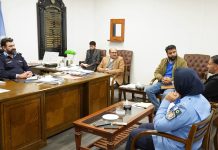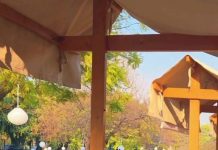By Asad Cheema
ISLAMABAD: The Asian Development Bank (ADB) and the United Nations Children’s Fund (UNICEF) signed a Letter of Understanding (LOU) on Wednesday to collaborate on water, sanitation, and hygiene (WASH) and solid waste management interventions under an ADB-funded project in the cities of Rawalpindi and Bahawalpur in Punjab province of Pakistan.
The agreement was signed by Yong Ye, ADB Country Director for Pakistan, and Abdullah Fadil, UNICEF’s Representative in Pakistan, at UNICEF’s Pakistan office in Islamabad.
“ADB and UNICEF are joining forces and renewing our shared commitment to strengthen policy, legislative framework, and institutional capacity in municipal service delivery, this time to improve the quality, coverage, and reliability of urban services under the Developing Resilient Environments and Advancing Municipal Services (DREAMS) Project,” said Mr. Ye. “The collaboration will enable us to support the government’s efforts to address water supply and solid waste management challenges in these two important and rapidly growing cities.”
Under the new partnership, ADB and UNICEF will collaborate to support inclusive, resilient, and sustainable urban infrastructure and services in Rawalpindi and Bahawalpur through public awareness and communication campaigns that will improve behaviors and practices related to water, sanitation, and solid waste management.
The understanding reached between ADB and UNICEF Pakistan offices will help promote sustainable, inclusive, and low-carbon municipal services that will benefit up to 1.5 million urban dwellers in the two cities of Punjab, the most populous province of the country.
“Signing of this agreement further strengthens the existing collaboration between ADB and UNICEF in Pakistan,” said Mr. Fadil. “Both organizations are committed to leveraging collective expertise and knowledge to help increase equitable access to water, sanitation, and hygiene services and to reduce the vulnerability of citizens, especially children and women, to growing climate change and environmental degradation.”
The close synergies between ADB’s DREAMS project and UNICEF’s WASH program present a significant opportunity to enhance the impact of the programs, ultimately leading to positive outcomes in water, sanitation, and hygiene that will benefit communities in Pakistan. The agreement will also pave the way for collaboration in future phases of the DREAMS project and other projects in Pakistan.
This is the second formal agreement between the two organizations at the country level, following the collaboration to procure emergency medical supplies and equipment during the COVID-19 pandemic.





